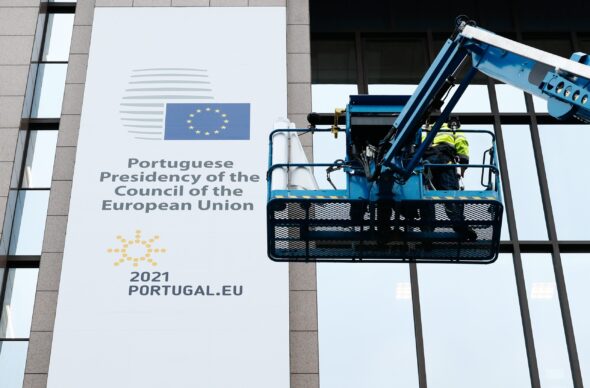On the 1st of January 2021 Portugal took over the EU presidency from Germany. The priorities of the Portugese presidency in the next six months will focus on the fight on poverty, exclusion, inequality, as well as the implementation of the EU climate policy whose goal is to reach climate neutrality by 2050. Hydrogen and climate regulations will be at the center of the looming disputes – Bartłomiej Sawicki, editor at BiznesAlert.pl, writes.
Portugal is the second member of the current presidency trio after Germany and before Slovenia. The three states want to achieve the goals laid out in the 18-month agenda for the three consecutive presidencies in the Council. It is Portugal’s fourth time as the leader of the EU.
Last year the EU decided it wanted to become a world leader when it comes to preventing climate change and in the next six months Portugal will stay on course to achieve that goal. The new presidency has already planned a conference on climate change in March and a meeting on green hydrogen (made from renewables), as well as a conference on energy transition in April.
More push for green energy
The European Green Deal is a tool that will be used to help reduce CO2 emissions by 55 percent by 2030 in comparison to 1990. Portugal wants to encourage others to design and use financial instruments that promote the Deal’s implementation thanks to the possibilities offered by the European Investment Bank. Portugal also wants to monitor various EU instruments that are engaged in implementing its climate policy, including the EU Strategy on adaptation to climate change, initiatives related to the action plan for a circular economy, chemical strategy, offshore energy and the EU forest strategy. When it comes to offshore wind energy and sustainable usage of sea and ocean resources, Portugal will organize a high-level conference in June on the Azores.
Hydrogen, but which?
Already in January the presidency will start working on the amendments to legislation that had been prepared last year. On the 26th of February, an important meeting on climate legislation will take place. At the beginning of April a high-level conference on green hydrogen will be held, and EU energy ministers will have an informal meeting at the end of the month. Subsidizing hydrogen, or rather the sources of its generation, may become the main bone of contention among member states.
Austria, Denmark, Luxembourg, Portugal and Spain called on the EU to make the production of green hydrogen a priority. The goal here is to make sure that EU money will not bankroll the generation of hydrogen from fossil fuels, such as gas, or from nuclear power. This is where doubts emerge. France may lobby for the latter solution, whereas Germany, which uses gas as a transition fuel, is considering the gas option, but combined with offshore wind. Whereas Poland is deliberating each of those options.
At the beginning of June, a meeting of ministers on EU maritime policy will be held. The participants will talk, among others, about reducing emissions thanks to maritime transport and the implementation of the maritime strategy on offshore renewable energy, which was drafted in late 2020. At the end of June the Council of the European Union will meet to discuss the energy sector.
No more subsidies for gas
The review of the Trans-European Networks for Energy (TEN-E) will be another important topic. The draft legislation will be more coherent and will stress the importance of networks for energy. Its goal will be to facilitate carbon neutrality, storage and the development of power systems and smart grids, as well as promote alternative fuels and green taxes. In December 2020, the European Commission introduced regulations that limit the financing of natural gas infrastructure. Brussels wants to redirect the money to low-emission technologies to achieve its climate goals. The EC proposed a new taxonomy for gas and power projects. It is based on the document, which had been used for the past decade. Back then EUR 4.7 bn was devoted to that end. According to Reuters, the EC excluded from its legislative proposal support for oil and gas infrastructure.
The presidency will continue negotiating on the European climate law to achieve the 2030 CO2 55 percent reduction target in comparison to 1990. In this context the discussion on supporting the 2050 climate neutrality goal by the member states may return.









